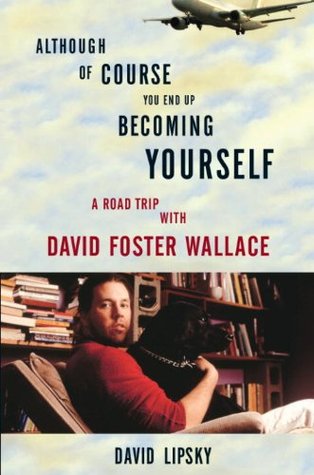More on this book
Community
Kindle Notes & Highlights
by
David Lipsky
Started reading
March 10, 2017
David’s
guessed. It was smarter. I recognized it, it was different from mine; every area of it was completely occupied by feeling. Neither of us knows where our lives are going to go, we’re both trying to decide who we’ll be at various points of arrival. We talk about what matters to any person. What to want, how to be a good person, how to read, how to write, how to think
at a certain point, we’re gonna have to build some machinery, inside our guts, to help us deal with this. Because the technology is just gonna get better and better and better and better. And it’s gonna get easier and easier, and more and more convenient, and more and more pleasurable, to be alone with images on a screen, given to us by people who do not love us but want our money. Which is all right. In low doses, right? But if that’s the basic main staple of your diet, you’re gonna die. In a meaningful way, you’re going to die.
And, uh, it’ll come awake again when poets start speaking to people who have to pay the rent, and fuck the same woman for thirty years. That’s off the record: that’s really nasty.
I think for you, the addict is the gibbering, life-that-completely-grinds-to-a-halt thing. And for me—and the thing that the book is about, is—it’s really about a continuum, involving a fundamental orientation. Lookin’ for easy pleasurable stuff outside me to make things all right. And I’m not saying there’s anything wrong with it. But I’m saying it’s a continuum, and that we slide.
I think this generation has it worse or better than any other. Because I think we’re going to have to make it up. I think we’re going to have to make up a lot of our own morality, and a lot of our own values. I mean, the old ones—the ’60s and early ’70s did a marvelous job of just showing how ridiculous and hypocritical, you know, the old authoritarian Father’s-always-right, don’t-question-authority stuff was. But nobody’s ever really come along and given us anything to replace it with. Reagan gave us a kind—I mean, the Reagan spasm I think was very much a story about a desperate desire to get
...more
I’m talking about the number of privileged, highly intelligent, motivated career-track people that I know, from my high school or college, who are, if you look into their eyes, empty and miserable. You know? And who don’t believe in politics, and don’t believe in religion. And believe that civic movements or political activism are either a farce or some way to get power for the people who are in control of it. Or who just … who don’t believe in anything.
Maybe grace is invisible. Maybe grace is invisible, but one of the things that’s magical about art is that art can set up contexts where we can understand and identify somehow with how one can put oneself in the position of being influenced by grace.
But what if, you know, what if I become this grotesque parody of just what the book is about?


